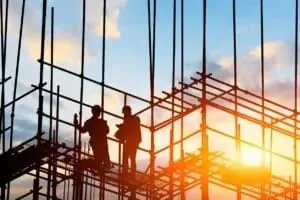WORKERS’ COMPENSATION IN THE CONSTRUCTION INDUSTRY
 Employers in the construction industry normally obtain their workers’ compensation insurance from insurance carriers who specialize in this market.
Employers in the construction industry normally obtain their workers’ compensation insurance from insurance carriers who specialize in this market.
- The premium cost of work comp insurance is higher in the construction industry than in most industries.
- This is due to the high frequency of claims combined with higher severity than normal.
Construction Companies Vary in Size and Complexity
Construction companies vary in size and complexity of their operations with most larger construction companies being located in urban areas.
- The hazards and risk associated with construction vary:
- Equipment
- Heights
- Uneven surfaces
- Constantly changing surroundings
- Safety training is an on-going issue as employees sometimes by-pass safety procedures and safety equipment, so the importance of safety requirements is emphasized.
Most of Workforce is Skilled Tradesman
Most of the workforce is skilled tradesmen with a smaller mix of apprentices. Often there will be a combination of employees and sub-contractors working together. Verifying workers’ comp coverage for all sub-contractors is often a concern on large projects.
Larger job sites operated by regional or national construction companies will often have a first-aid trailer staffed by a nurse available for immediate medical care of cuts, abrasions and other small injuries.
- When the injury is more significant, the on-site nurse will refer the employee to doctors who routinely handle work comp claims, or to emergency care if such is warranted.
- Because projects are completed and the company then begins another project at a different location, often states away from the other one, finding modified duty at the same job site is often not possible, so companies use companies like National Job Finders and Soar Research.
Indemnity Benefits Near or At Maximum Level for State
Due to the physical demands and training needed to perform as skilled tradesmen, most employees of construction companies are earning wages that result in their indemnity benefits either near or at the maximum level for their state.
- Construction industries injuries tend to be higher in severity than other industries, the medical benefits paid by work comp insurance are also higher.
- Carpal tunnel and other repetitive motion injuries occur to painters, roofers and other tradesmen.
Construction covers many different aspects. Some of the sub-categories of construction that would have the same or similar work comp issues include:
- Painters
- Roofers
- Masonry construction
- Plumbers
- Electricians
- Heating, Ventilating and Air Condition (HVAC) technicians
- Carpenters
- Drywall installers
- Sheet metal workers
- Glass installers
- Floor covering installers
Transitional / Modified Duties in the Construction Industry
Accommodation of construction workers is not always easy due to the seasonal nature of the industry, jobs that end, and heavy physical requirements of the jobs. However, there are possibilities. This is an ideal industry to consider sending an employee to work at a non-profit agency during periods of restricted work. Working for a charitable organization will keep the employee active and productive versus being at home focused on an injury and disability.
If there is an applicable union contract, be sure to review the terms to verify modified duty is not prohibited or restricted. Modified duty positions include:
Sample Transitional Duty Jobs
| Flagger: | Allow the employee to direct traffic by holding up a sign. |
| Yard Work: | Bring an employee in to work in the yard reviewing and updating vehicle records. |
| Office Work: | Assist office workers, catch up on filing, data entry or light clean up. |
| Inventory Control: | Track the use of materials and equipment. |

